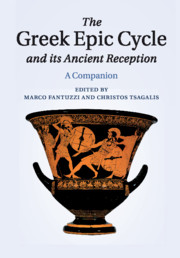Book contents
- Frontmatter
- Contents
- List of illustrations
- List of contributors
- Editorial note
- Introduction: Kyklos, the Epic Cycle and Cyclic poetry
- PART I APPROACHES TO THE EPIC CYCLE
- 1 Coming adrift: The limits of reconstruction of the cyclic poems
- 2 Oral traditions, written texts, and questions of authorship
- 3 The Epic Cycle and oral tradition
- 4 The formation of the Epic Cycle
- 5 Motif and source research: Neoanalysis, Homer, and Cyclic epic
- 6 Meta-Cyclic epic and Homeric poetry
- 7 Language and meter of the Epic Cycle
- 8 Narrative techniques in the Epic Cycle
- 9 Wit and irony in the Epic Cycle
- 10 The Trojan War in early Greek art
- PART II EPICS
- PART III THE FORTUNE OF THE EPIC CYCLE IN THE ANCIENT WORLD
- Works cited
- Index of principal passages
- Index nominum et rerum
8 - Narrative techniques in the Epic Cycle
from PART I - APPROACHES TO THE EPIC CYCLE
Published online by Cambridge University Press: 05 August 2015
- Frontmatter
- Contents
- List of illustrations
- List of contributors
- Editorial note
- Introduction: Kyklos, the Epic Cycle and Cyclic poetry
- PART I APPROACHES TO THE EPIC CYCLE
- 1 Coming adrift: The limits of reconstruction of the cyclic poems
- 2 Oral traditions, written texts, and questions of authorship
- 3 The Epic Cycle and oral tradition
- 4 The formation of the Epic Cycle
- 5 Motif and source research: Neoanalysis, Homer, and Cyclic epic
- 6 Meta-Cyclic epic and Homeric poetry
- 7 Language and meter of the Epic Cycle
- 8 Narrative techniques in the Epic Cycle
- 9 Wit and irony in the Epic Cycle
- 10 The Trojan War in early Greek art
- PART II EPICS
- PART III THE FORTUNE OF THE EPIC CYCLE IN THE ANCIENT WORLD
- Works cited
- Index of principal passages
- Index nominum et rerum
Summary
To deal with the narrative technique of works only preserved in fragments, as in the case of the poems of the Epic Cycle, is a daring task. Yet, as regards, in particular, the epics of the Trojan Cycle, i.e. the Cypria, the Aethiopis, the Ilias parva, the Iliou persis, the Nostoi and the Telegony, it is worth undertaking this task only because we are relatively well informed about the structure of these poems by Proclus' summary and their prose narration by Ps.-Apollodorus. Whereas, in the case of the epics of the Theban Cycle, i.e. the Oedipodea, the Thebaid and the Epigonoi, for which we totally lack such auxiliary sources and whose – strongly hypothetical – reconstruction is limited to a few essential facts about the plot of each poem, we cannot even attempt a similar undertaking. Of course, even in the case of the epics of the Trojan Cycle, the nature of the sources is such that only assumptions can be made about the representation of time in these epics. For, due to the meagreness of the preserved lines from all six epics (90 genuine lines in Davies, 100 in West) one can say next to nothing about other elements of the narrative such as the narrator, the focalization or the insertion of direct speech. Still, our sources create considerable difficulties even in respect to narrative time. On the one hand, it is only natural that brief summaries such as those by Proclus or Ps.-Apollodorus tend to eliminate any deviations from the linear reproduction of the narrated story. On the other, Proclus, our main evidence, poses a very special problem to those searching for prolepses, analepses or other deviations from the linear narrative in his summary. I refer to the still unresolved question about the boundaries between the epics in the summaries of his Chrestomathia, and to the concomitant question of whether the fragments that seem to exceed the boundaries of each epic as set by Proclus should be seen as analeptic or proleptic passages within their respective time frame or if we are simply faced with an artificial and therefore erroneous demarcation of each epic plot on his part. Within the same context, another specific problem is raised: whether Proclus tailored the events at the end of the Cypria to suit the plot of the Iliad.
- Type
- Chapter
- Information
- The Greek Epic Cycle and its Ancient ReceptionA Companion, pp. 154 - 163Publisher: Cambridge University PressPrint publication year: 2015
- 1
- Cited by



